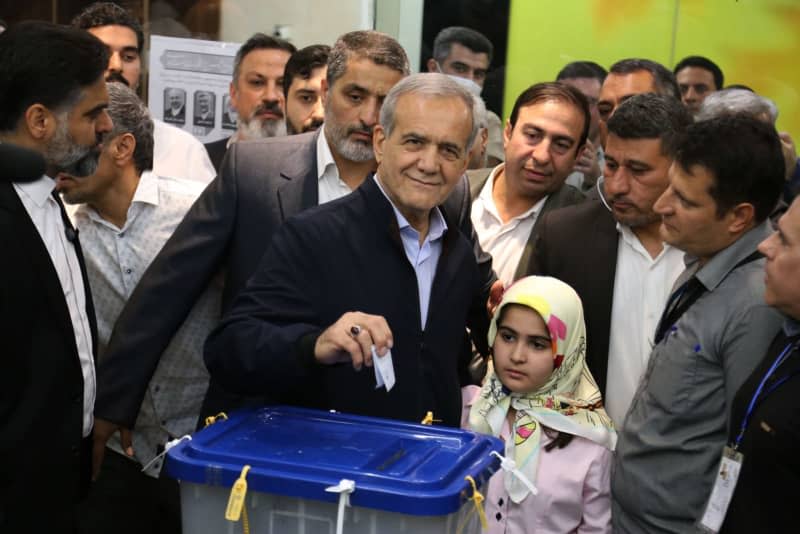Reformist candidate Masoud Pezeshkian and conservative hardliner Saeed Jalili will go to a run-off in Iran’s presidential election next week, after record low turnout in the first round.
Pezeshkian received 42.5% of the vote and Jalili followed at 38.7%. As neither achieved an absolute majority, the run-off will take place on July 5, the country’s electoral authority said.
There were two other candidates in the race: current parliamentary speaker Mohammad Bagher Ghalibaf garnered nearly 14% of the vote while cleric Mostafa Pourmohammadi got less than 1%.
Some 61 million voters in Iran were eligible to elect a successor to hardliner Ebrahim Raisi on Friday, after he died in a helicopter crash in May.
Out of a total of 80 candidates, the Guardian Council, a powerful Islamic supervisory body that vets the hopefuls, had only authorized six candidates for the election.
Two of six later withdrew, leaving three conservatives and the one more moderate candidate, Pezeshkian. Jalili is a loyal supporter of the leaders at the top of the Islamic Republic’s system of power.
After the results were announced, Ghalibaf pledged his support to Jalili. In a statement published by state news agency IRNA, he asked his backers to help prevent Pezeshkian coming to power.
The electoral authorities counted a total of 25.5 million votes cast on Friday. That puts turnout at around a historically low 40%. In the last presidential election in 2021, it was around 49%.
The polling stations were scheduled to close at 6 pm on Friday, but the authorities then extended voting until midnight to allow more people to take part.
Conservative reformer vs hardline insider
Pezeshkian, 69, comes from north-west Iran and ran a low-key campaign calling for renewed trust between the government and Iranians, many of whom have become disillusioned with politics after failed attempts at reform, political repression and an economic crisis.
In the early 1990s, Pezeshkian lost his wife and one of his sons in a road accident. He often appeared at his campaign rallies with his daughter and grandchild.
In the TV debates, he described himself as a conservative politician who believes reforms are necessary. Like many politicians from the reformist camp, Pezeshkian has called for improved in relations with the West.
He criticized Iran’s strict headscarf requirements for women and campaigned for votes with middle-class positions.
At the same time, Pezeshkian expressed his loyalty to Supreme Leader Ayatollah Ali Khamenei and the powerful Revolutionary Guards. He praised Iran’s attack on Israel with drones and missiles.
The second-placed Jalili was an early member of the inner circle of power and worked in the office of Khamenei.
Under the controversial former president Mahmoud Ahmadinejad, Jalili was chief negotiator in the nuclear negotiations. He enjoys broad support from radical and loyal supporters of the system.
He holds a doctorate in political science and comes from the north-eastern city of Mashhad.
During the Iran-Iraq war in the 1980s, Jalili was wounded at the front and lost part of his right leg. After the war, he taught in the capital Tehran before embarking on a career in the Foreign Ministry.
Jalili is considered a staunch supporter of the ideology of the Islamic Revolution in Iran.
Limited room for reforms
A moderate president would have limited opportunities to shape the government, political scientist Tareq Sydiq from Marburg University in Germany told dpa.
“With a parliament dominated by hardliners, with a supreme religious leader who has repeatedly signalled that too moderate a policy is not really desirable – I wouldn’t expect much room for manoeuvre,” explains the Iran expert.
That has contributed to the low interest in the election among Iranian voters, Sydiq said, since a moderate president is unlikely to be able to fulfil his election promises.
Enthusiasm for elections has been low for years, he said, citing the disastrous record of previous governments, coupled with protests and their violent repression.
The mood is mainly characterised by “disillusionment and hopelessness,” Sydiq said.
Economic crisis top issue
The election comes amid a severe economic crisis, as well as tensions with the West and regional powers in the Middle East. Frustration among the public with the enforcement of state authority, especially among the younger population, is running high.
During the election campaign, the candidates primarily debated ways to pull the country out of its economic troubles.
Iran is subject to international sanctions due to its controversial nuclear programme and is largely cut off from the global financial system, but is in need of billions of dollars in investment.
Many Iranians, especially young people, have however lost faith in the possibility of seeing major political change at home. Some activists, student organizations and the imprisoned Nobel Peace Prize-winner Narges Mohammadi had called for a boycott before the election.
The death of the young Kurdish woman Jina Mahsa Amini in autumn 2022 sparked nationwide protests against the Islamic system of rule, but the protests were quashed with harsh punishments for demonstrators.
The president is only number two in Iran’s power structure as Supreme Leader Khamenei functions as the head of state and has the final say in all strategic matters. He is also commander-in-chief of Iran’s armed forces.
Deadly attack on election vehicle
Unknown assailants attacked a vehicle belonging to election workers in south-eastern Iran late Friday, killing two security personnel.
The incident took place in Sistan and Baluchestan Province as ballots were being transported to the city of Rask.
No group immediately claimed responsibility for the attack.
The Sunni militant separatist group Jaish al-Adl is active in the province and have stepped up their attacks in the area. Both Iran and the United States classify Jaish al-Adl as a terrorist organization.



